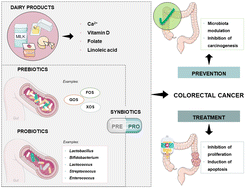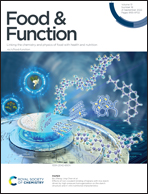Colon microbiota modulation by dairy-derived diet: new strategy for prevention and treatment of colorectal cancer
Abstract
An unbalanced diet is one of the well-known risk factors for the development of colorectal cancer (CRC). This type of cancer is currently the main cause of cancer-related deaths worldwide, urging the need for new and more effective preventive and therapeutic approaches. It is already known that CRC patients have alterations in the microbial community and metabolism. In this regard, a concept that has been recently attracting the attention of the scientific community is the development of functional food or nutraceuticals, as a new and more effective strategy to overcome CRC patient-associated dysbiosis. Particularly, dairy product enriched diets are the major dairy source of dietary calcium, vitamin D and folate intake, which are well-known to have a protective effect against CRC development. In addition, these products are rich in both pre- and probiotics, constituting a double strategy to modulate both the intestinal microbiota composition and the production of microbial metabolites. Short-chain fatty acids (SCFA), namely, acetate, butyrate, and propionate, are major contributors to colonic homeostasis since they regulate several biological and metabolic processes. In this review, we performed a state of art study concerning the use of dietary patterns, specifically the dairy-derived diet, in the modulation of the human microbiota and their potential use as pre-, pro- or synbiotics for the development of new preventive and therapeutic strategies for CRC.

- This article is part of the themed collection: Food & Function Review Articles 2022


 Please wait while we load your content...
Please wait while we load your content...